Independence Day: Key takeaways from PM Modi's speech
- Published
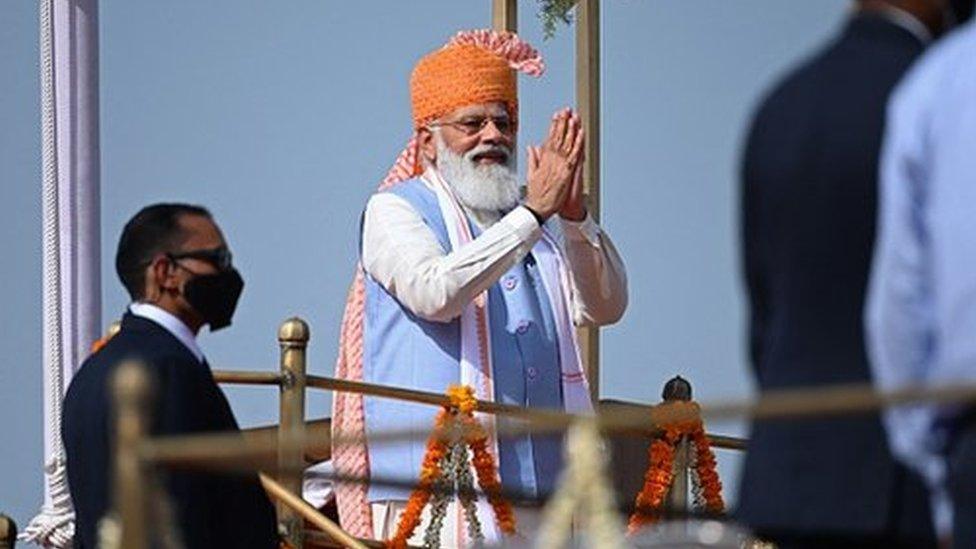
Indian Prime Minister Narendra Modi praised healthcare workers and scientists for helping India fight Covid-19 as the country celebrated 75 years of independence.
Mr Modi also paid tributes to those who died of the virus, saying "the pain of losing them will stay with us forever".
He added that the country fought the virus "with extraordinary pace".
But his government faced criticism when India's second Covid wave ravaged many towns and cities in April and May.
The second wave left millions of people infected and overwhelmed the country's fragile healthcare system to the point of collapse.
People died gasping for breath as hospitals ran out of beds and oxygen - leaving distraught family members pleading for help on social media. Even crematoriums in some cities ran out of space.
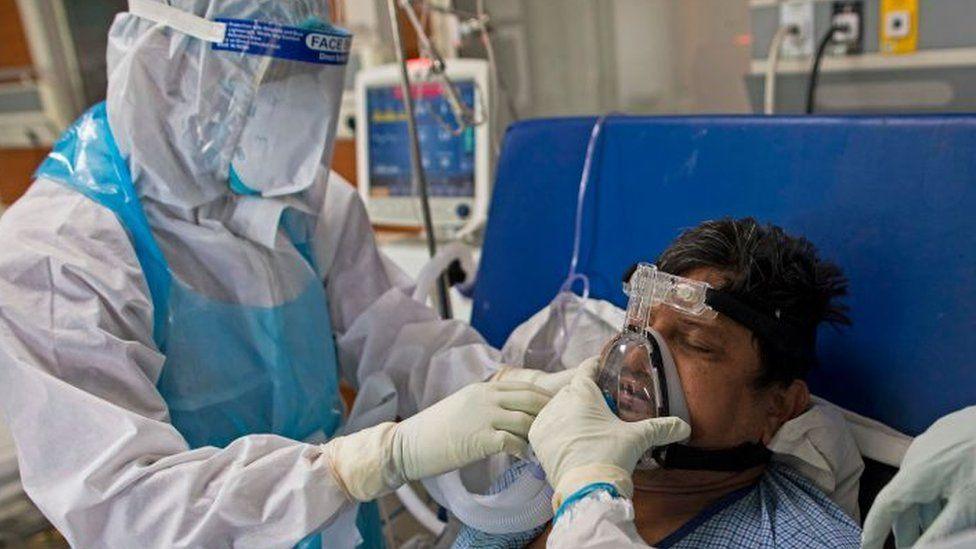
Indian doctors worked in extremely difficult condition in April and May
Daily case counts have since fallen sharply from a high of 400,000 at the peak of the crisis to around 30,000 to 40,000. But there is a looming fear of a third wave as millions of Indians are still vulnerable.
In his speech from Delhi's historic Red Fort complex on Sunday, Mr Modi also praised India's vaccination programme, saying more than 500 million people in India had received at least one dose.
However, only 12% of the population has been fully vaccinated in India, data shows.
The government aims to vaccinate all adults by the end of this year, but the drive has been hobbled by slow pace, shortage of doses and vaccine hesitancy.
Apart from focusing on Covid, Mr Modi spoke about India's historic performance at the Tokyo Games, the country's development goals, the economy and climate change.
Here are the key takeaways from his speech:
Glory in Tokyo
Mr Modi started this year's ceremony by honouring India's Olympics contingent.
India recorded its best-ever showing at Tokyo this year by winning seven medals - one gold, two silver and three bronze - surpassing the six it won in London in 2012. Many of the medal winners were invited as special guests at the ceremony on Sunday.
"These players have not just won all our hearts but have set an example for future generations," Mr Modi said.
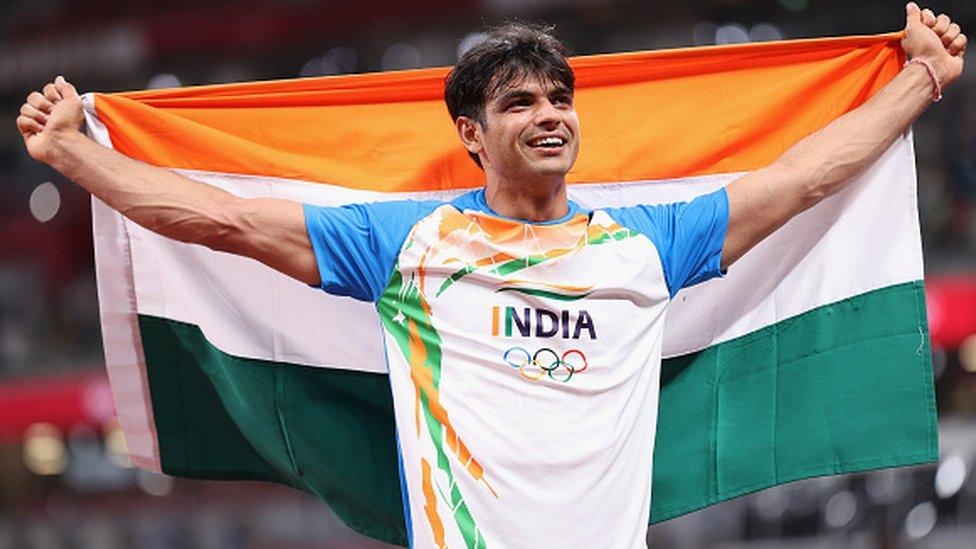
Neeraj Chopra won the country's first-ever athletics gold in javelin throw
Economy
Mr Modi also spoke about his vision for India's development, saying the next 25 years will mark the country's growth story.
He talked about boosting manufacturing and exports, encouraging home-grown industries and promoting innovation. For this, the prime minister said, the government would launch an infrastructure plan worth $1.35tn (£983bn).
The aim is to ensure that the benefits of the economy should trickle down to every village and town in India, he added.
But Mr Modi's promises come at a time when the Indian economy is struggling to recover from the damage caused by coronavirus. Growth had been faltering even before 2020 and the pandemic has made matters worse.
India's GDP shrunk by an unprecedented 7.3% in the previous financial year as the pandemic wiped out businesses. The virus has left deep scars - unemployment is on the rise while inflation remains high.
The government has repeatedly spoken of achieving a sharp recovery in the coming months. But several financial institutions, including the World Bank and the International Monetary Fund, have revised expectations downwards.
Farmers
In recent days, Mr Modi's biggest challenge has been to tackle the growing discontent among India's farmers who are angry with a set of new laws aimed at reshaping the country's agriculture industry.
Tens of thousands of farmers have been camping on the outskirts of Delhi since November in protest against these laws.
It wasn't surprising that he referred to the community several times in his speech, saying his government aims to make small farmers - who own less than two hectares of land - "the pride of India".
"In the coming years, we will have to increase the collective power of the small farmers of the country. We have to give them new facilities. They must become the country's pride," Mr Modi said.
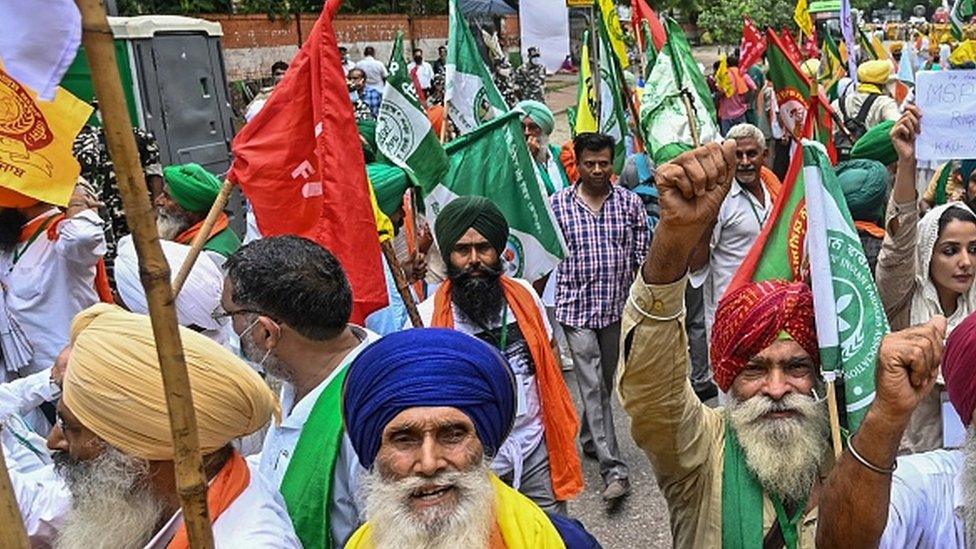
The farmer protests have posed one of the biggest challenges to Mr Modi's government
Partition
Mr Modi also announced that India will mark 14 August every year as "Partition Horrors Remembrance Day". He said the decision was taken to honour those who died in the bloodied partition of India in 1947.
But his critics say that marking the day will only open painful memories for many.
India celebrates its Independence Day a day after its neighbour Pakistan. The two newly-independent states were created after the partition of British India in 1947. The process triggered one of the largest migrations in human history as millions of people fled their homes and tens of thousands died.
Climate change
The prime minister talked about the importance of handling climate change, adding that India was committed to meet its target of reducing its carbon footprints.
He announced that his government would invest more in greener sources of energy. He particularly talked about increasing investments in solar energy.

Vikas Pandey, BBC News, Delhi
Mr Modi's speech lacked details. He acknowledged that many Indians died of the virus, but didn't talk about the oxygen shortage issue. He mentioned Covid vaccination but didn't talk about the need to increase the pace of the drive. He also didn't say much about the fears of a third Covid wave and how his government plans to handle it this time.
The PM presented a grand vision of India's growth story in the next 25 years, but didn't say much about his strategy to overcome the immediate challenges of the struggling economy, which has been marred by high inflation and rising unemployment. There was no word on regional security either. His usual enthusiasm in speeches was also missing. He was in his trademark style of working up the crowds only when he talked about India performance in Tokyo. It seem his subdued style reflects the many challenges India is facing - there is little to celebrate at the moment. But his speech also had positives like the focus on green energy, building roads in villages and ensuring all Indians have a bank account in the near future.
Related topics
- Published27 July 2017
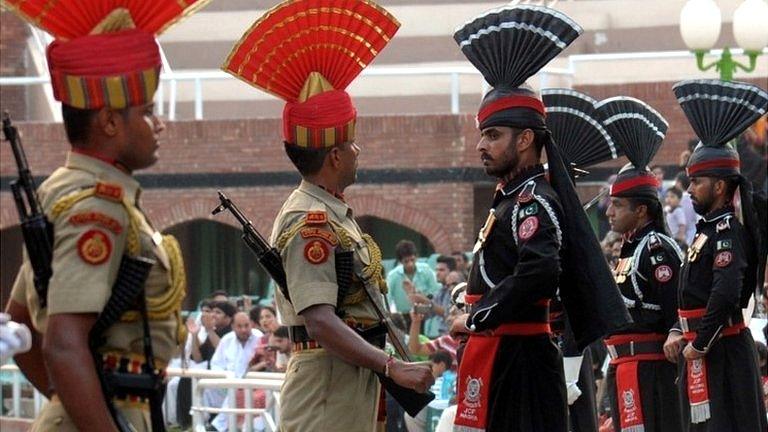
- Published19 April 2021